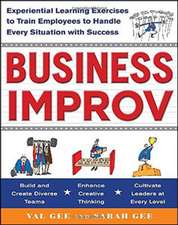The Effect of Team Composition on Strategic Sensemaking: Research in Management Accounting & Control
Autor Tanja Waldeck Cuvânt înainte de Prof. Dr. Utz Schäfferen Limba Engleză Paperback – 23 aug 2007
Din seria Research in Management Accounting & Control
-
 Preț: 386.99 lei
Preț: 386.99 lei - 15%
 Preț: 439.56 lei
Preț: 439.56 lei -
 Preț: 353.61 lei
Preț: 353.61 lei - 15%
 Preț: 442.48 lei
Preț: 442.48 lei - 15%
 Preț: 438.88 lei
Preț: 438.88 lei -
 Preț: 451.65 lei
Preț: 451.65 lei -
 Preț: 383.12 lei
Preț: 383.12 lei -
 Preț: 384.86 lei
Preț: 384.86 lei -
 Preț: 384.48 lei
Preț: 384.48 lei -
 Preț: 383.33 lei
Preț: 383.33 lei -
 Preț: 383.12 lei
Preț: 383.12 lei -
 Preț: 385.62 lei
Preț: 385.62 lei -
 Preț: 387.75 lei
Preț: 387.75 lei - 15%
 Preț: 497.64 lei
Preț: 497.64 lei - 15%
 Preț: 443.46 lei
Preț: 443.46 lei -
 Preț: 447.84 lei
Preț: 447.84 lei - 15%
 Preț: 442.98 lei
Preț: 442.98 lei - 15%
 Preț: 473.99 lei
Preț: 473.99 lei - 15%
 Preț: 441.51 lei
Preț: 441.51 lei - 15%
 Preț: 472.04 lei
Preț: 472.04 lei -
 Preț: 483.70 lei
Preț: 483.70 lei - 15%
 Preț: 526.18 lei
Preț: 526.18 lei
Preț: 383.93 lei
Nou
Puncte Express: 576
Preț estimativ în valută:
73.46€ • 76.71$ • 60.66£
73.46€ • 76.71$ • 60.66£
Carte tipărită la comandă
Livrare economică 15-29 aprilie
Preluare comenzi: 021 569.72.76
Specificații
ISBN-13: 9783835005563
ISBN-10: 3835005561
Pagini: 260
Ilustrații: XVI, 244 p.
Dimensiuni: 148 x 210 x 16 mm
Greutate: 0.32 kg
Ediția:2007
Editura: Deutscher Universitätsverlag
Colecția Deutscher Universitätsverlag
Seria Research in Management Accounting & Control
Locul publicării:Wiesbaden, Germany
ISBN-10: 3835005561
Pagini: 260
Ilustrații: XVI, 244 p.
Dimensiuni: 148 x 210 x 16 mm
Greutate: 0.32 kg
Ediția:2007
Editura: Deutscher Universitätsverlag
Colecția Deutscher Universitätsverlag
Seria Research in Management Accounting & Control
Locul publicării:Wiesbaden, Germany
Public țintă
ResearchCuprins
The Cognitive Theory of Strategic Sensemaking.- Empirical Research on Strategic Sensemaking of Top Management Teams.- Research Design.- Ten Management Teams and Their Strategic Sensemaking.- Propositions on Strategic Sensemaking of Top Management Teams.- Implications and Outlook.
Notă biografică
Dr. Tanja Prinzessin zu Waldeck promovierte bei Prof. Dr. Utz Schäffer am Lehrstuhl für Controlling der European Business School, Oestrich-Winkel. Sie war fünf Jahre als Beraterin bei McKinsey & Company tätig. Seit Mai 2007 hat sie sich mit NetMoms.de selbständig gemacht – einer Internetplattform für Mütter.
Textul de pe ultima copertă
Top management teams constantly need to deal with changes in their environment, for instance changing customer demand, social environments, or supplier situations. They try to understand how these changes can affect their organization and adapt their organizational strategy. But teams differ in the ways they make sense of their environment and accordingly in the decisions they make and the success they have.
Tanja Prinzessin zu Waldeck analyzes the effects of the composition of top management teams on their strategic sensemaking process. Based on the results of ten case studies, she shows that the diversity of experiences of team members supports the team to pick up strategically relevant environmental changes early and to develop a wide range of strategic alternatives. The author also indicates that the diversity of a team does not affect the speed with which teams come up with strategic decisions, but that speed appears to be influenced more by the personalities, leadership style, and culture in a top management team. Furthermore, she implies that family and state-controlled businesses are more likely to experience problems in their team composition than public ones.
Tanja Prinzessin zu Waldeck analyzes the effects of the composition of top management teams on their strategic sensemaking process. Based on the results of ten case studies, she shows that the diversity of experiences of team members supports the team to pick up strategically relevant environmental changes early and to develop a wide range of strategic alternatives. The author also indicates that the diversity of a team does not affect the speed with which teams come up with strategic decisions, but that speed appears to be influenced more by the personalities, leadership style, and culture in a top management team. Furthermore, she implies that family and state-controlled businesses are more likely to experience problems in their team composition than public ones.









